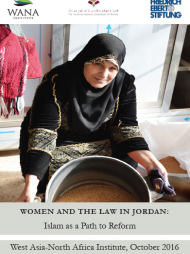-
Women and the Law in Jordan: Islam as a Path to Reform ...
Women and the Law in Jordan: Islam as a Path to Reform
This paper provides an analysis and critique of the legal provisions concerning violence against women, child custody, paternity, early marriage and inheritance in Jordan. It focuses on these specific areas because they were deemed both areas of challenge for women, and ones with wide potential for reform. The paper demonstrates the complex and dynamic relationship between Islam, law and tribal traditions, and how these operate to disempower and curtail women’s rights. The aims are to open a dialogue on the possibility of legal reform through modern and contextualised interpretations of Shari’a, and to offer recommendations to legislators, legal practitioners and non-government organisations on how Islamic norms and jurisprudence may be used to promote structural and normative change.

